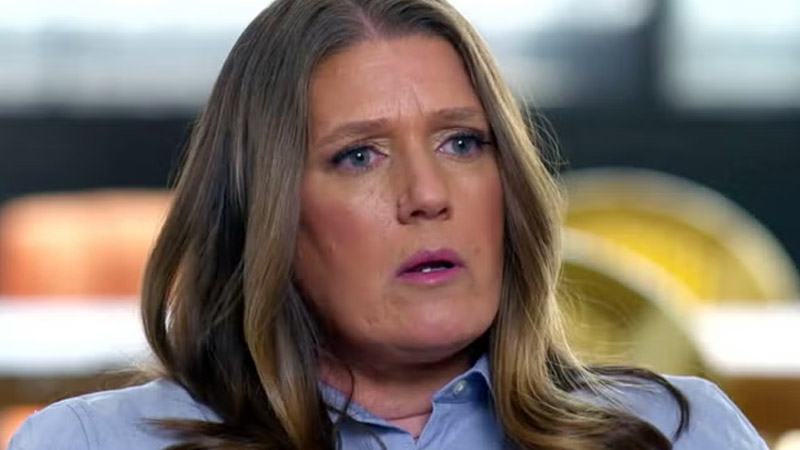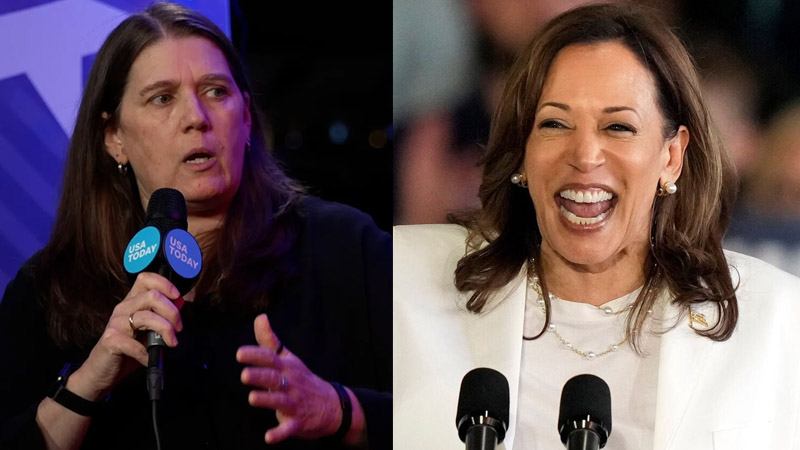Psychologist and author Mary Trump, the niece of President-elect Donald Trump, sharply criticized political pundits on Monday for misrepresenting the reasons behind Vice President Kamala Harris’ campaign loss. In a strongly-worded email blast, Mary Trump blamed the defeat not on Harris’ campaign strategy but on deep-rooted systemic issues, including racism, misogyny, and the media’s skewed portrayal of the campaign.
According to Mary Trump, the pundit class, represented by figures like Morning Joe‘s Mika Brzezinski and New York Times columnist Maureen Dowd, suggested that Democrats lost because they had distanced themselves from the working class while overly focusing on social justice issues. But Mary Trump believes this analysis is oversimplified and inaccurate, particularly in light of Harris’ actual campaign focus. “If you listen to pundits,” she wrote, “you would be under the impression ‘Democrats lost touch with the working class because they talked too much about transgender rights.
It was Joe Biden’s fault. It was Kamala Harris’ fault. But apparently the bleak permanence of American racism and misogyny, the almost unimpeded rise of fascism, and a system so broken the Republican Party actually nominated, and America elected, an insurrectionist in direct violation of Article 3 of the 14th Amendment had nothing at all to do with the dark turn we’ve taken.”
Mary Trump further asserted that media pundits should take a hard look at their own role in shaping public narratives. In her newsletter, she urged the media to “look in the mirror” rather than push the blame onto Democrats without addressing the larger societal issues. A fierce critic of her uncle and the media’s handling of the 2024 election coverage, Mary Trump contends that the pundits missed the central focus of Harris’ campaign: the economy and working-class issues.

Mary Trump defended Harris’ campaign strategy, stating, “Harris’ campaign was laser-focused on the working class and the policies that would most benefit them; she pushed back or deflected every single effort the media made to push her into a fight about identity politics.” She emphasized that Harris maintained her focus on substantial issues, repeatedly refusing to engage with divisive topics when the media attempted to steer her that way.
For example, when Harris was questioned about Donald Trump’s disparaging comments regarding her background, she dismissed it as a distraction from pressing issues, choosing instead to concentrate on her economic policies. The media, Mary Trump added, largely ignored Harris’ proposals, choosing instead to portray her as lacking a concrete policy agenda. “The press claimed, falsely, that Harris didn’t have any policy proposals.
When she unveiled them, as with her plan to expand Medicare to cover extended home health care for the elderly (which would have helped tens of millions of Americans), she was ignored,” Mary Trump pointed out. Amid the political upheaval, Mary Trump noted that the incoming president has been widely criticized by economists for proposing massive tariffs on consumer goods, a move expected to lead to higher costs for American consumers.

However, she argues that pundits continue to avoid addressing the deeper implications of Trump’s approach and instead repeat worn-out criticisms of Democrats. Rather than offering a balanced assessment, Mary Trump believes mainstream media pundits have simply “wasted time on their typical and tired blame-the-Democrats assessments,” ignoring the systemic factors that have contributed to a “fraught and dangerous era.”
She concluded with a stark warning: “A fascist is putting together the most extreme cabinet in modern American history. Good job, everybody.” With her critique, Mary Trump is calling for a reevaluation of media narratives that may have oversimplified the reasons behind Harris’ campaign loss, advocating instead for a more honest look at the factors that have contributed to the current political climate.

